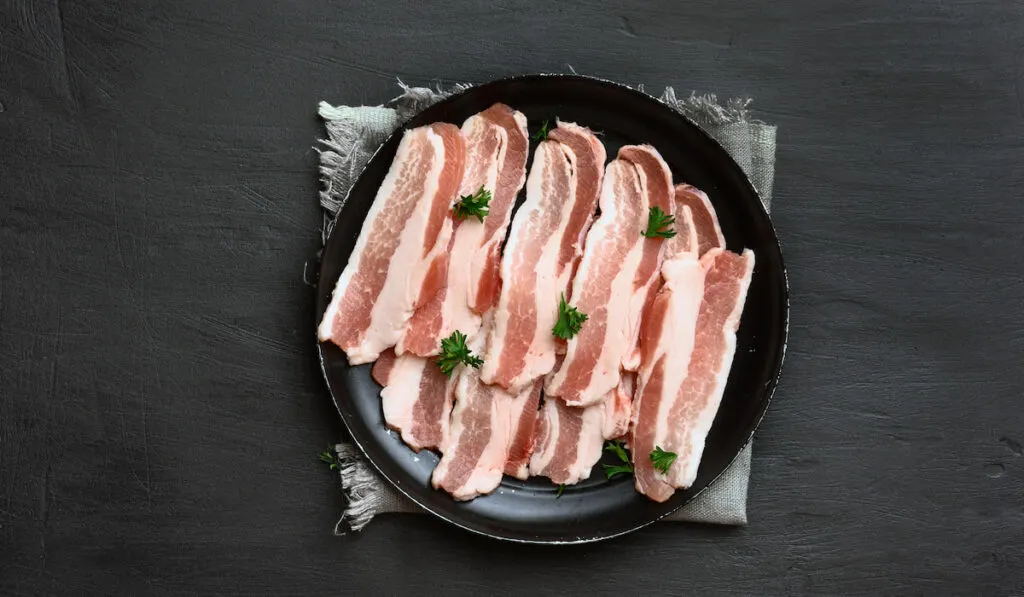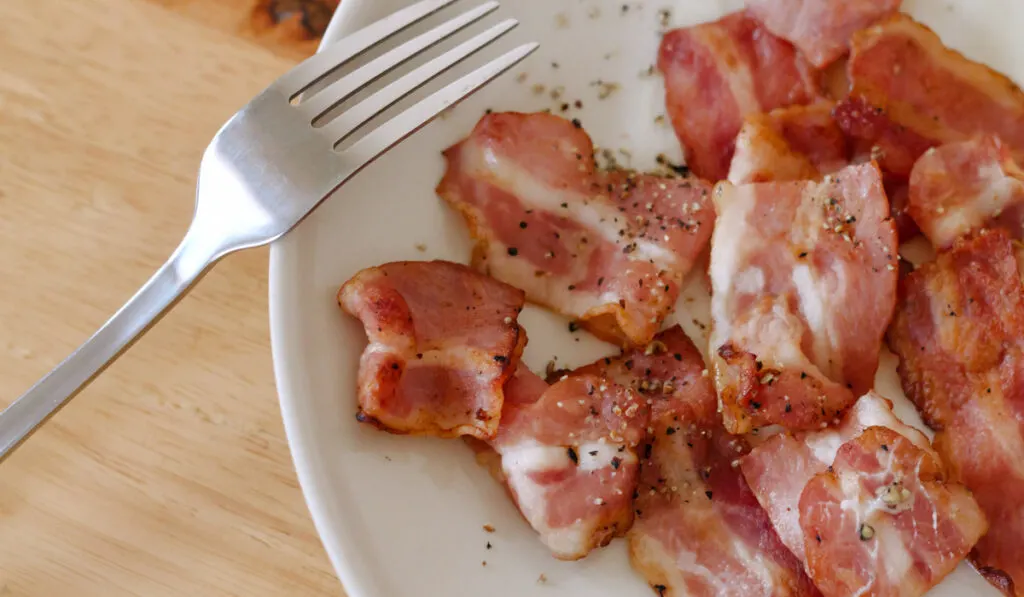Bacon is popular around the globe for its aroma and delicious taste. Most bacon packages have a sell-by-date indicated, but this doesn’t dictate the period you can safely consume it. Just like any other type of meat, bacon cannot last forever, even when frozen.
Bacon is very delicious, but without the proper storage, it can quickly spoil. This meat is high in fat and water, meaning it has a higher risk of bacterial contamination, making it easily rancid.
Depending on whether or not it has been opened or cooked, the shelf-life of bacon varies from 4 – 14 days. However, to be safe, if not frozen, bacon should be consumed within the first two weeks of purchase.
If you suspect that your bacon has gone bad, you need not worry. You can easily distinguish spoiled bacon in a few simple tests, but the smell is the most common. This article will help you through the signs of bad bacon and how to best store it for a prolonged shelf-life.
Table of Contents
Signs of Bad Bacon
You can easily distinguish fresh bacon from spoiled by paying a keen look into details of smell, texture, and appearance. Let’s have a look.
1. Smell
Fresh bacon, whether in the packets or served, often has a pleasant smell, the smell of fresh meat. However, if it gets a sharp, weird, and foul smell, like it’s rotting, this is a clear indication that your bacon is already infected with bacteria and is no longer safe for consumption. It should be discarded immediately.
2. Texture
When you feel it, fresh bacon is moist and soft. However, if it gets a bit slimy and sticky (probably because of lactic acid bacteria), it’s a clear indication of spoilage and should be immediately discarded. For safety with other perishable products, remember to wash and sanitize your hands after discarding spoiled bacon.
3. Appearance

Fresh bacon is generally pinkish with white layers of fat that can at times be yellowish. If you take a good look at your bacon in a room with good illumination, you can easily distinguish good bacon from bad bacon.
Fresh bacon always looks fresh and bright and is pinkish. However, if you notice traces of dull greenish dots that gradually turn grey-brown on the bacon, this is a clear sign that your bacon has gone bad and is no longer safe for consumption.
4. Tiny fuzzy flecks
Once cooked, the meat will eventually get moldy if left for prolonged periods inside the fridge. However, no matter the period it has been stored in the fridge, if you notice small fuzzy spots of either blue or white on the bacon, these are signs of spoilage, and it won’t be safe to eat.
Can You Freeze Bacon?
Just like any other meat, bacon is suitable for freezing. It is most recommended to freeze your bacon solely to extend its shelf-life.
Under appropriate freezing conditions, frozen bacon can last up to six months.
However, to best maintain its delicious taste and fine texture, it is recommended to utilize the bacon within the first two weeks to a month of freezing.
If cooked, bacon will stay fresh in the fridge for about 4-5 days. However, if it has been kept sealed for that entire time while in the fridge, it might last a bit longer, but this can be risky in terms of edibility.
When stored in the fridge, cooked bacon might lose some of its crispness, but not to worry, it works well for salads and sandwiches.
Average Shelf Life of Bacon
Many factors are considered when determining whether bacon is suitable for consumption, including how it is stored, the bacon type, and whether or not it’s cooked. So, how long can bacon be safely stored?
- Unopened fresh bacon can last in the refrigerator for up to 2 weeks and up to 8 months in the freezer. However, opened but not cooked bacon has a shelf life of about one week in the refrigerator and can last to about six months in the freezer.
- On the other hand, even when properly stored, cooked bacon has a short shelf life and can be safely stored for about 4 – 5 days in the refrigerator and up to 1 month in the freezer before going bad. If you would want to preserve bacon grease after cooking, it can either be safely refrigerated for up to 6 months or frozen for up to 9 months.
- How about on the counter? When it comes to any raw meat, fresh bacon included, you should never let it sit out in the open for more than four hours since it easily spoils and can get a weird smell after being exposed to air for a while. It can really hurt throwing it away, but it is better than getting sick. However, it should be discarded, for cooked bacon, if left out at room temperature for over 2 hours. Room temperature favours optimal growth of bacteria, and cooked bacon gets easily infected.
- Unlike regular bacon, there are a few varieties of bacon that have a slightly different shelf life. Canadian bacon, for example, when cooked, can be safely refrigerated for 3 – 4 days or frozen for 4 – 8 weeks. Other types like turkey bacon, pancetta and beef bacon have shelf lives similar to regular bacon in the refrigerator and the freezer.
Storing Bacon

Whether cooked or uncooked, bacon should be stored in the appropriate conditions to optimize its shelf life while maintaining quality. Cooked and uncooked bacon have different storing processes, as explained below.
Before buying your bacon, you should always check the sell-by date clearly stated on the package. This is always the first step to avoiding bad bacon and ensuring you have the freshest product.
To store unopened and uncooked bacon in the freezer, wrap it using tin foil to prevent freezer burns when freezing.
However, if opened, wrap the bacon with paper towels before storing them. These paper towels will help absorb moisture on the bacon, helping to maximize the shelf life. Further, tightly wrap opened bacon with aluminum foil or plastic wrap, or store it using re-sealable plastic bags or containers.
Cooked bacon should be chopped into tiny portions and decently wrapped with paper towels before further storage in shallow airtight containers, heavy-duty freezer bags, or either wrapped with plastic wrap or aluminum foil. This is a practice that maximizes the cooked bacon’s shelf life by preserving quality, in turn ensuring the safety of the bacon for consumption.
For left-over bacon, on the other hand, freezing is the best option. However, it might take away the crispness of pan-fried bacon, but on the positive side, it halts any microbial action on the meat, helping to preserve it further.
Remember to always store your bacon in a refrigerator or a freezer and regularly check it to ensure it is still fresh. If not properly stored, bacon will easily go bad. If you find it has gone bad, immediately throw away the bacon to prevent further contamination of other products in the storage unit.
What if You Eat Bad Bacon?
You will never eat bad bacon out of negligence, but what if you accidentally did it?
You will be at risk of food poisoning. This will be accompanied by symptoms like nausea, vomiting, headache, fever, abdominal pain, and body aches. Spoilt bacon is more susceptible to attracting bacteria like Salmonella, Bacillus, Escherichia coli, Staphylococcus, and Clostridium, which are responsible for later illnesses. A foul smell will accompany their presence.

In case of food poisoning due to bad bacon, many cases often resolve without any specific medication. However, the cases may at times get extreme with severe symptoms like vomiting blood, severe dehydration, high fever, and severe abdominal pains. In any occurrence of such instances, you should immediately consult your doctor for proper treatment.
In a different perspective, bacon is always deemed bad for having plenty of fats that cause the high cholesterol associated with many health conditions. However, when consumed in the right proportions, bacon has more health benefits compared to its downsides.
Conclusion
Distinguishing bad bacon is quite simple. Learning some of the common signs like the foul smell and slimy texture helps to tell the fresh from the spoiled quickly. Appropriate storage also helps preserve bacon by maximizing the shelf life while preserving the bacon’s quality.
To ensure that you have the freshest bacon, always check on the sell-by date and get the freshest product.
Resources
- https://www.streetsmartkitchen.com/how-to-tell-if-bacon-is-bad/
- https://www.healthline.com/nutrition/bacon-expiration
- https://makerlandfoodie.com/how-to-tell-if-bacon-is-bad/
- https://www.stilltasty.com/fooditems/index/16428
- https://www.bhg.com.au/how-long-does-bacon-last
- https://onthegas.org/food/how-long-can-you-keep-cooked-bacon/
- https://www.myrecipes.com/extracrispy/how-long-can-bacon-be-out-of-fridge
